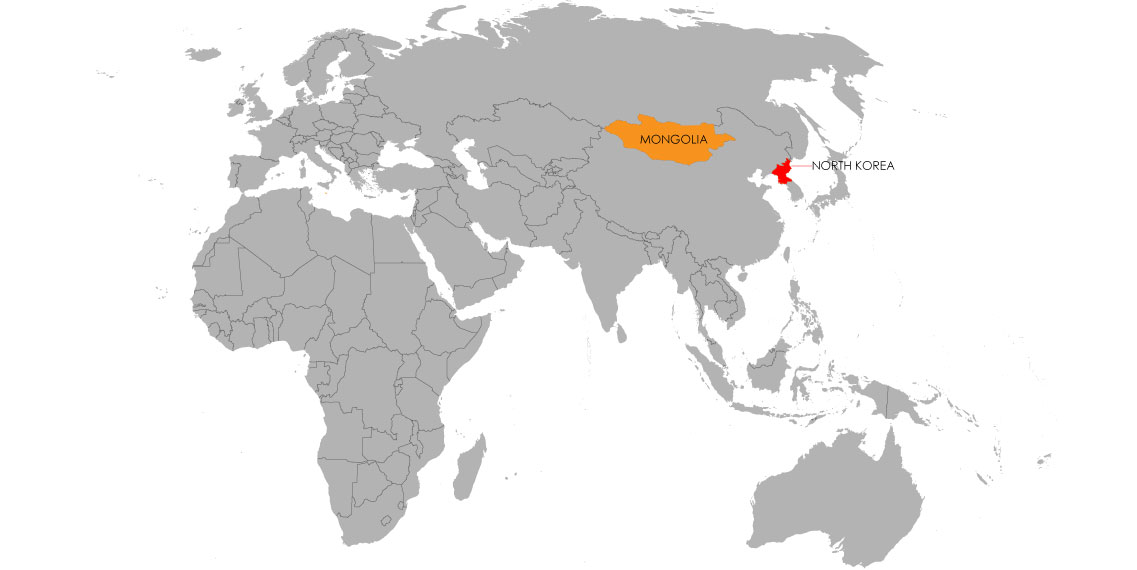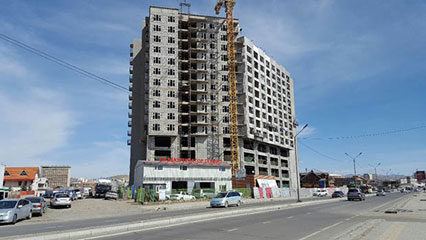Mongolia's Economic Downturn Means Sporadic Work, Tough Times for North Korean Workers (Part 2)

At a construction site in Mongolia’s capital Ulaanbaatar, three North Korean workers put the finishing tiles into place in the bathroom of a two-story preschool recently opened as part of a new apartment complex. One worker, who goes by the pseudonym Kim Eun Cheol, shows a reporter from RFA’s Korean Service how to take sections from tiles to fill in the remaining empty spaces on the wall.
“We put the tiles up ourselves and this is the patchwork we do using tiles cut into smaller pieces,” he explains.
Kim tells RFA that he and his fellow North Koreans, who were sent to Mongolia by Pyongyang to earn foreign currency for the Kim Jong Un regime, paid for their own room and board while helping to build the preschool. He said that they had learned to “manage” despite the cold Mongolian spring, which sees temperatures drop to below zero degrees Celsius (32 degrees Fahrenheit) in the morning and hover around 10 degrees Celsius (50 degrees Fahrenheit) during the day—far colder than in North Korea.
 A construction site in Ulan Bator, Mongolia, that is known to
employ North Korean workers. Photo: RFA
A construction site in Ulan Bator, Mongolia, that is known to
employ North Korean workers. Photo: RFA
North Korean defector Kim Tae San, who is the former president of the North Korean-Czech Republic Joint Footwear Production Company, told RFA that authorities in Mongolia pay little heed to the job and lodging conditions of foreign workers in the country.
“When I went to Mongolia in 1996, there were people from the North
Korean Department of Military Engineering working on bridge
construction,” he said.
“Even then, North Korean workers didn’t have a designated
lodging area and spent the cold winter in a 20-foot (six-meter)
container without proper accommodations. This was done in order to
save money.”
According to one Mongolian construction official, who took RFA to the preschool site in Ulaanbaatar and spoke on condition of anonymity, North Korean workers are viewed favorably in Mongolia because they are mostly “highly skilled, hard workers.”
Worker Kim told RFA said that he and other North Koreans traveled to Mongolia on visas they received after their handlers signed a contract with a Mongolian company to provide labor for construction.
“So at this Mongolian company, we build apartments and do everything
from bonding and plastering work to finishing up,” he said.
When asked if he had made any money for himself while
living in Mongolia, Kim replied, “Yes, I did, but not much.”
Little pay
The Mongolian construction official acknowledged that North Koreans make little money and are often made to pay for their own living costs while working in the country.
“It is difficult for North Korean workers to find income from [outside
their official jobs], and additionally they must rent rooms and
commute, which all costs money,” he said.
“When they move to other construction sites, their
priority becomes their living quarters and they often board right at
the site. Seeing this saddens me.”
According to the official, the average monthly wage for North Korean workers in Mongolia is around 400,000 tughrik (U.S. $190), compared to 600,000 tughrik (U.S. $290) for Mongolian workers performing the same job.
At another construction site for a residential complex in the capital, RFA encountered more North Korean workers who explained that they were dividing larger apartments into smaller homes.
“We closed up the middle of one apartment and made it into two homes,”
said one of the workers, who declined to give his name.
“We are now finishing up by tiling the bottom section. It
was originally a four-room apartment but we divided it into two
two-room homes.”
One worker rested and watched television in one of the empty rooms, as others prepared dinner by boiling a pot of stew on an attached balcony.
The resting worker said his crew of four had taken three days to section off the apartments, plaster the walls and complete the work, but added that they were only paid by job, rather than the time required to complete it.
“When we work, we don’t count it by hours, but [by] … the amount of work we will do,” he explained.
Tough conditions
In the 1990s, Mongolia underwent an economic transformation that required a skilled workforce to improve its construction and mining industries, and in 2007 the country signed a labor exchange agreement with North Korea, following a visit to Ulaanbaatar by president of the Presidium of the Supreme People's Assembly of North Korea Kim Yong Nam.
In accordance with the agreement, Mongolia employed 5,000 North Korean workers between 2008 and 2013. Since 2014, however, a severe economic recession has hampered the country’s construction industry and currently only some 1,500 North Koreans remain.
For those North Koreans still in Mongolia, work can be sporadic, with projects often halting construction and companies shutting down operations.
According to the Mongolian construction official, when work opportunities arise, North Korean crews will often spare workers to take the jobs, leaving project sites dangerously understaffed.
“Suppose around 30 North Koreans work at one site—when there is work for five people, they will take them out and the remaining 25 will work the site as if they still have 30 people,” he said.
In addition to working on understaffed construction sites, North Koreans in Mongolia often take on extra jobs to supplement their meager wages, forcing them to work seven days a week and leaving them exhausted for their regular shifts.
They are regularly hired for jobs which begin before they are able to secure a place to stay, requiring them to sleep in basements or other areas unfit for lodging in the country’s cold climate.
Defector Kim told RFA that during his time in the Czech Republic, workers were required to stay in lodgings designated by the country according to strict labor laws and could not sleep more than four to a room.
“In the case of Mongolia, however, since there are no such regulations, workers have no problem sleeping at construction sites or in containers,” he said.
Cost-cutting measures rarely translate into additional income for workers, Kim added.
“Just because you save some fees for room and board, it doesn’t mean
the money goes to the North Korean workers themselves,” he said.
“The money sometimes ends up going to the North Korean
government and officials often sponge off of the workers as well.”
Reported by Jae-wan Noh for RFA’s Korean Service. Written in English by Joshua Lipes.